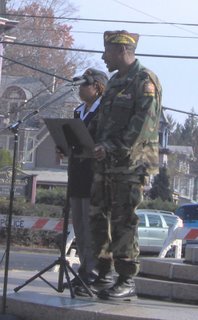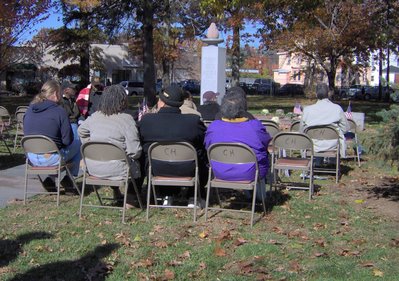At his first budget session, acting Finance Director
Ray Daniels promised to put in place an “assets management” program for everything from police cars to computers.
Daniels was named acting director of the city’s largest department last week. He made his comment after council members questioned a capital request for 10 police vehicles. Recalling prior requests, Councilwoman
Linda Carter said at some point they should “level out.” Councilman
Harold Gibson, who also heads the Union County public safety program, said vehicles should be retired as new ones are purchased. Councilman
Rashid Burney called for better “fleet management” and tracking of major equipment, prompting Daniels’ response.
On Monday, the council reviewed budget requests for Municipal Court, Plainfield Action Services, Bilingual Day Care, the Comptroller’s office and capital projects. At the next session on Tuesday, Dec. 5, the council will revisit police and inspections and review budget requests for other finance divisions, including the tax collector, tax assessor, purchasing and personnel.
Judge
Joan Robinson Gross presented the budget for the Municipal Court and asked for proposed cuts to be restored. Gross said in contrast to other courts that have a high volume of traffic cases, Plainfield has a heavy criminal calendar with assessments that go to other jurisdictions, such as a $500 state fee and $75 county fee.
“Most of the money does not come to the city,” she said.
But the court must still maintain records on site, send out its own mail for timeliness, pay for video-conferencing with prisoners, keep the court complex secure and provide translations in a variety of languages.
Burney questioned a decline in revenues, but Gross said the court can only deal with “what comes in” in the way of cases. She said if the Police Division goes back to being fully staffed, the numbers might go up. But she said court staff should not be cut.
Gibson said the revenues are down because “our crime rate is down.”
“That doesn’t mean you need less staff to do the work,” he said.
“Let’s focus somewhere else if crime is down,” Carter said, suggesting a focus on traffic.
Rick Smiley, director of the city’s anti-poverty agency, said “Crime is down, but poverty is definitely up.”
Smiley said Plainfield Action Services helped 6,200 people last year. Noting that 22 percent of city schoolchildren “live in poverty,” as indicated by eligibility for the federal school lunch program, Smiley said, “We’re still in bisiness. We’re an anti-pverty agency and business is good.”
The agency helps people with utility bills, housing, nutrition, emergency food, employment services and tenant advocacy. Disputing a $15,000 cut in staff costs, Smiley said the agency deals with walk-ins all day and can’t cut staff.
“We’re hopping all the time,” he said.
Burney questioned how the agency’s salary costs went from $8,190 several years ago to $85,000 today. Smiley said salary costs increased, despite most of the funding coming from outside sources. He said the agency’s main funding grant has stayed flat, while salaries have risen. Councilman
Cory Storch suggested that grants are available and should be sought to reduce municipal costs for the agency.
Smiley said he has sought foundation grants as governmental grants have waned.
The Bilingual Day Care program also gets mostly outside funding, but would be hurt by a proposed $18,000 reduction in city funds, Smiley said.
“They need to cover janitorial costs,” he said.
At best, the program may be able to come up with about half that amount in additional grants, Smiley said.
In his report, Comptroller
Peter Sepelya said investments increased from $191,000 to $821,000 and “payment in lieu of taxes” or PILOT revenues were projected at $679,484 but came in at $844,363. His division processed 8,100 purchase orders and paid 500 city employees with 13,000 bi-weekly checks.
The division also monitors and prepares federal, state and county grants and is currently managing 75 active grants, he said. The budget surplus will increase in 2007 to $3.6 million, he said.
The council moved on to the capital budget, which was in two parts, one for information technology and one for all other capital projects. The information technology budget was $8 million over six years.
The session continued with a discussion of how $900,000 in recently announced state aid will affect the budget. Sepelya said the budget increase will be reduced from 8.7 percent to 6.2 percent. The council’s goal is to get it down to 3.2 percent or less, requiring further cuts.
Storch asked about this year’s budget process, noting some staffing changes.
While he did not spell it out, the city actually had no finance director in place since March. Former City Administrator
Carlton McGee was in charge of day-to-day city operations as well as its largest department, Administration and Finance, Health and Social Services. McGee’s departure in October left both positions vacant.
According to the City Charter, the mayor, with the assistance of the city administrator, reviews departmental budget proposals and prepares the executive budget.
As Storch probed the process this year, Sepelya said, “I put the budget together.”
“Just you?” Storch asked.
Daniels said from now on, there will be an ongoing budget process, including feedback from all the current budget sessions on what was proposed and what was spent. The documentation and data will be used for next year, he said.
--Bernice Paglia
















